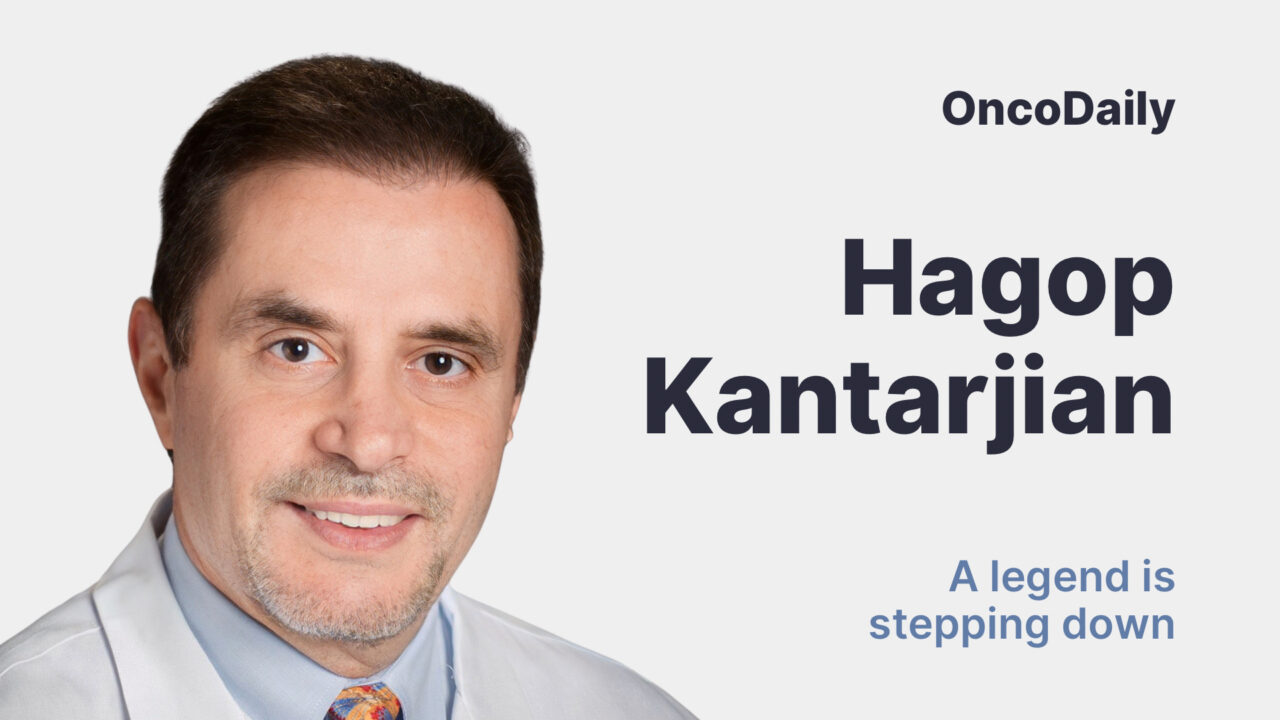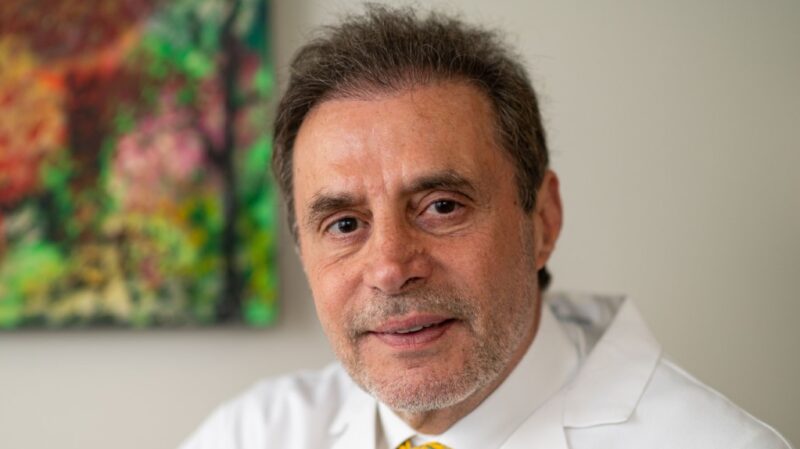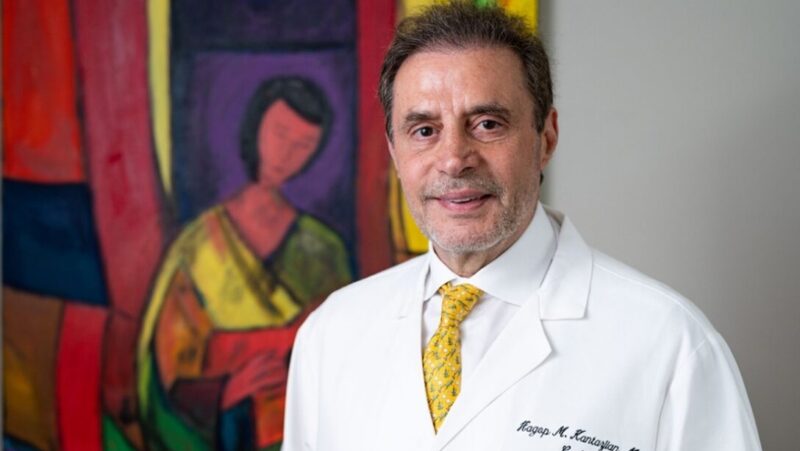
Hagop Kantarjian: A legend is Stepping Down
Hagop Kantarjian, M.D., Chair of the Department of Leukemia at The University of Texas MD Anderson Cancer Center, is stepping down after nearly four decades of groundbreaking leadership, clinico‑research advancements, and mentorship.
Early Life and Education
Hagop Kantarjian was born in Beirut in 1954 in an Armenian family. During his youth, Kantarjian was deeply affected by the struggles of Lebanon’s civil war, which motivated him to devote his life to hard work and helping others.
Kantarjian’s academic journey began at the American University of Beirut, where he earned a Baccalaureate II in 1972 and a Bachelor of Science degree in 1975. He pursued his medical degree at AUB, graduating as an MD in 1979. His postgraduate training included an internship and residencies in internal medicine at AUB, where he developed a strong foundation in clinical practice. In 1981, he moved to the United States to specialize further, completing a fellowship in hematology and medical oncology at The University of Texas MD Anderson Cancer Center in 1983. This marked the beginning of his career in the field of leukemia research and treatment.
In an interview with the Cancer History Project, Dr. Hagop Kantarjian shared the story of how he became a leukemia specialist. As he approached university, Dr. Kantarjian decided he wanted to become a cancer expert. In 1978, while a third-year medical student at the American University of Beirut in Lebanon, he took the opportunity to join an elective at MD Anderson. Dr. Freireich, a renowned cancer and leukemia expert, welcomed him, and it was during this time that Dr. Kantarjian realized the extent of cancer expertise at MD Anderson, despite being told there was a lack of it. The era’s cancer treatments were limited to chemotherapy, radiation therapy, and surgery.
After completing his four-month elective, Dr. Kantarjian returned to Lebanon, eager to return to MD Anderson. In July 1981, he returned for a two-year fellowship, eventually choosing to specialize in leukemia. Looking back, he believes that his decision to pursue leukemia research, inspired by his admiration for Dr. Freireich, was the best choice he could have made, shaping the course of his life and career in the field of cancer research.
Career
Dr. Kantarjian was a Professor and Chair of the Department of Leukemia at The University of Texas MD Anderson Cancer Center, where he holds the Samsung Distinguished Leukemia Chair in Cancer Medicine. Additionally, he serves as a non-resident fellow in health policy at Rice University’s Baker Institute.
Dr. Kantarjian’s journey at The University of Texas MD Anderson Cancer Center began in 1981 when he joined as a fellow in the Department of Developmental Therapeutics. Over the next few years, he progressed through several key roles, including Faculty Associate in the Department of Hematology from 1983 to 1984 and Assistant Professor from 1984 to 1988. He was promoted to Associate Professor in 1988, a position he held until 1993, before advancing to leadership roles. From 1998 to 2015, he served as the Kelcie Margaret Kana Research Chair in the Department of Leukemia.
Dr. Kantarjian has actively contributed to nearly 20 institutional committees at The University of Texas MD Anderson Cancer Center, serving in various capacities, including member, chair, vice chair, and co-chair. His leadership roles include chairing the Subcommittee of the Faculty Achievement Award Parent Committee in 2000 and the Search Committee for the Department of Melanoma from 1999 to 2000.
He also co-chaired the Promotion and Tenure Committee during the same period and served as Vice Chairman of the Surveillance Committee from 1995 to 1996. Additionally, he has been a long-standing member of the Physicians Referral Service Executive Council, the Clinical Research Committee, and the Executive Committee of the Faculty Senate, reflecting his enduring commitment to advancing institutional governance and academic excellence.
In addition to his roles at MD Anderson, Dr. Kantarjian has held various influential positions in the broader medical and policy community. Dr. Hagop Kantarjian was instrumental in the founding of the Society of Hematologic Oncology (SOHO) and currently serves as a board member and secretary. He also served as President of the International Association for Comparative Research on Leukemia and Related Diseases (IACRLRD) from 2015 to 2017.
Hagop Kantarjian was also actively involved with the American Society of Clinical Oncology (ASCO). He served on the ASCO Board of Directors from 2010 to 2015, contributing to the organization’s strategic direction and policy-making process. He has been involved in various ASCO committees, including Board Liaison for the Cancer Communications Committee, a member of the Audit Committee, and on the Education Subcommittee of the ASCO Board in 2015 and 2016. Furthermore, Dr. Kantarjian contributed to health policy as a Fellow at Rice University’s Baker Institute for Public Policy from 2013 to 2015.
Dr. Kantarjian holds memberships in several prestigious professional organizations including the American Society of Clinical Oncology, National Comprehensive Cancer Network (NCCN), American Society for Hematology, American Association for the Advancement of Sciences, American Association for Cancer Research, and American Medical Association.

A blog by Leonard Zwelling
“I was, thus, deeply disturbed to learn that Hagop had stepped down from his chairman’s job after thirty years. No one will ever convince me that this was voluntary. If this was a decision from above, it is a bad one, but I suspect Hagop’s passion and Hagop’s demands were not shared by the current leadership of Cancer Medicine or of MD Anderson. I do know his faculty adored him.
Hagop was the last remaining power player within Cancer Medicine. He truly represents the last connection to the glory days of Freireich, Krakoff, Bast, and Hong to today.
For me, this is an end of an era at MD Anderson. I believe that the end began twenty years ago, as readers of the blog know. This is the final blow to MD Anderson’s leadership in clinical research. I really don’t know if any of the current clinical leaders can match Hagop when it comes to expertise or productivity. I hope someone can tell me who that person is if he or she is currently on staff.
In the meantime, if you see Hagop in the hall, thank him. He kept the flame of Freireich and Keating alive. I am not sure to whom the mantle falls now or if it will be picked up at all.
I do hope Hagop continues to contribute to the fight against leukemia whether at MD Anderson or elsewhere. And if he decides to do more painting (he is a truly skilled artist) or write his memoirs (a likely good read), that’s OK, too.
He may well be the last of his kind at MD Anderson.”
Chadi Nabhan, Chief Medical Officer and Head of Strategy at Ryght, shared a post on X:
“It saddens and surprises me to see this – A legend Hagop Kantarjian who has changed how we approach leukemia forever is stepping down. A blog by Leonard Zwelling just out.”
Beyond The White Coat
Dr. Hagop Kantarjian isn’t just a leading leukemia specialist; he’s also an artist at heart. Since 1992, he’s painted over 500 canvases, and some of his Fauvist-style paintings are displayed in the Leukemia Department at MD Anderson. For Dr. Kantarjian, both art and medicine are about creating something new and meaningful. “In both, you’re always striving to innovate and bring something into the world that didn’t exist before,” he says.
“I’ll never be a professional artist,” Kantarjian insists.

“I’m not that disciplined about it. I don’t paint unless I feel the urge. However, people who are deeply involved in their professions need to have some outlet where they can step outside of their normal roles and just enjoy life. Art and exercise are what take up most of my time outside of MD Anderson.”
When he’s not in the lab or painting, Dr. Kantarjian cherishes time with his family. He’s also an avid reader, drawn to the works of Salman Rushdie, Philip Roth, and Graham Greene.
Written by Nare Hovhannisyan, MD
-
Challenging the Status Quo in Colorectal Cancer 2024
December 6-8, 2024
-
ESMO 2024 Congress
September 13-17, 2024
-
ASCO Annual Meeting
May 30 - June 4, 2024
-
Yvonne Award 2024
May 31, 2024
-
OncoThon 2024, Online
Feb. 15, 2024
-
Global Summit on War & Cancer 2023, Online
Dec. 14-16, 2023

